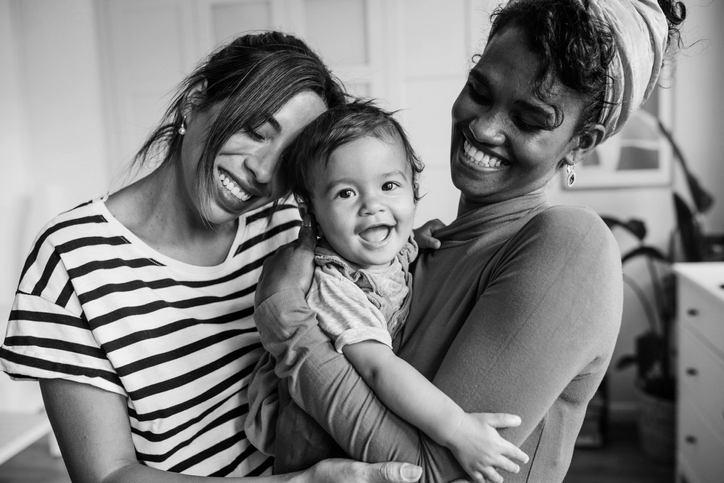Basic needs banks are committed to the idea that everyone should have the material basic necessities that they need to thrive. Everyone means everyone, thus basic needs banks must always strive to be intersectional in how they offer their services.
What is intersectional feminism?
The term “intersectional feminism” was coined by Kimberlé Williams Crenshaw, a legal scholar and civil rights advocate at the forefront of critical race theory. “Sexism isn’t a one-size-fits-all phenomenon,” she said. “It doesn’t happen to Black and White women the same way.” Crenshaw called out the feminist movement, which had historically been led by White women, for ignoring the experiences of discrimination faced by Black and Brown women, who simultaneously face racism and sexism. For example, one of the early victories of U.S. feminists was achieving women’s suffrage. Yet Black women continued to be denied access to the polls in the Jim Crow South. If White feminists has been thinking and acting interesectionally, their allyship would have compelled them to protest this exclusion just as vigorously as they had protested when their own voting rights were denied.
Today intersectionality highlights identities beyond gender and race, including sexuality, gender identity, disability status and more. All of the identities that we hold affect our experiences of privilege and discrimination.
What makes an organization intersectional?
A good allyship definition is: Acting in solidarity with a group to which you do not belong. The first step toward allyship is listening. That’s one reason why so many of the National Diaper Bank Network (NDBN) benchmarks for member growth emphasize community connections. A basic needs bank has to know who it is serving and if services are delivered in a way that creates barriers for some groups of people.
Allyship also insists on representation, among staff, board members and partner agencies. Anyone involved with a nonprofit must have the freedom and power to bring their identity to work, to offer insight on how policies and programs do or do not serve the groups they identify with.
Intersectional feminism and period poverty
Period supply programs need to take into account varied cultural beliefs around menstruation; how poverty differs between racial and ethnic groups; and how menstrual dysphoria may affect LGBTQ people.
When we talk about period stigma, we are very much talking about the perception of menstruation in the dominant White culture. But that’s not the only game in town. For example, the Kwek Society provides period supplies in indigenous communities. The group also educates about “Moon Time,” a traditional way of looking at menstruation positively, complete with community celebrations of first menses.
A growing body of research shows that women of color experience period poverty at higher rates. For example, a study by a George Mason University researcher showed that on a college campus, Black and Hispanic women were most likely to experience period poverty, with first generation and immigrant students also at higher risk. This folds in with a broader societal inequity in which Black and Hispanic women face overall poverty at elevated rates. Fighting period poverty should be an act of racial justice and as such needs to examine how location, language and other barriers can be overcome to get products to the people who need them.
Period poverty overwhelmingly affects women and needs to be seen in the context of other gendered forms of economic inequality. However, people experiencing gender dysphoria are very likely to also experience menstrual dysphoria. A recent study of transgender and non-binary teens identified at birth as female showed that 93% experienced distress around their periods and wanted their menses to stop. Programs that fight period poverty can help by making sure to use inclusive language. They can also partner with clinical and social service organizations to make sure that clients who do not identify as female get access to important health information. We highly recommend looking into the work of the Period Pantry Project, which surveyed LGBTQ clients to find better ways to serve them.
Intersectional feminism and diaper need
Research on diaper need has found that Black and Hispanic women are significantly more likely than White women to report diaper need. The same research shows an association between diaper need and maternal depression, which plays a large role in the national maternal health crisis. Thus addressing diaper need is a key strategy to promote health equity.
The nonprofit sector itself has an equity problem. A 2023 report showed that Black-led and Black-benefitting nonprofits are largely operating on lean budgets and heavily reliant on volunteer labor – in large part because their access to funding is limited. Previous studies showed that organizations run by Black women have poor access to financial support and that funders tend to attach more strings to grants given to these organization.
The Black Diaper Bank Leaders Coalition is a member-led group at the National Diaper Bank Network where Black women leading diaper banks support each other and share knowledge and resources. NDBN has a staff liaison working with the coalition to bring ideas back to the national organization about how it can be more responsive to the needs of these organizations.
Acting – and thinking – locally
One of the great strengths of NDBN is the network itself, more than 300 independent nonprofits dedicated to serving their communities equitably. The national organization leads with a commitment to serving all communities and makes tools to do so available to all members. Members come up with great strategies to serve their particular communities and share them through venues like a member listserv and our annual U.S. Conference on Poverty and Basic Needs.
“I’m proud of the work we’ve done to promote an intersectional approach to basic needs,” said NDBN CEO Joanne Samuel Goldblum. “We know that there is much more that we can do to make sure that diaper need and period poverty are wiped out across all communities in the United States. We’re committed to doing just that.”

